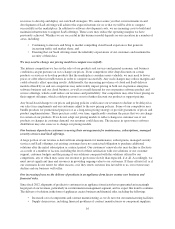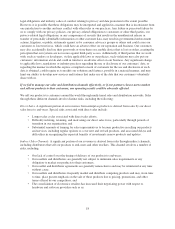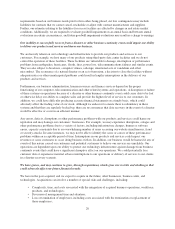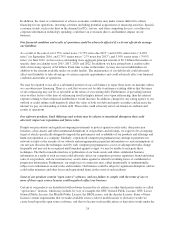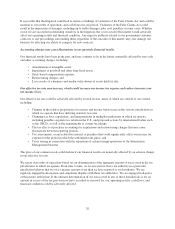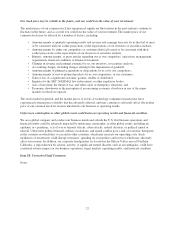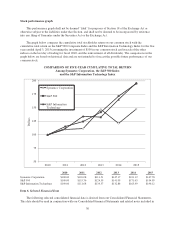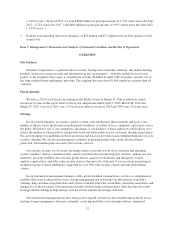Symantec 2015 Annual Report Download - page 104
Download and view the complete annual report
Please find page 104 of the 2015 Symantec annual report below. You can navigate through the pages in the report by either clicking on the pages listed below, or by using the keyword search tool below to find specific information within the annual report.It is possible that the litigation could lead to claims or findings of violations of the False Claims Act and could be
material to our results of operations and cash flows for any period. Violations of the False Claims Act could
result in the imposition of damages, including up to treble damages, plus civil penalties in some cases. Whether
or not we are successful in defending ourselves in the litigation, the cost to resolve this matter would adversely
affect our operating results and financial condition. Any negative publicity related to our government customer
contracts or any proceedings surrounding them, regardless of the outcome of this matter, may also damage our
business by affecting our ability to compete for new contracts.
Accounting charges may cause fluctuations in our quarterly financial results.
Our financial results have been in the past, and may continue to be in the future, materially affected by non-cash
and other accounting charges, including:
• Amortization of intangible assets;
• Impairment of goodwill and other long-lived assets;
• Stock-based compensation expense;
• Restructuring charges; and
• Loss on sale of a business and similar write-downs of assets held for sale.
Our effective tax rate may increase, which could increase our income tax expense and reduce (increase) our
net income (loss).
Our effective tax rate could be adversely affected by several factors, many of which are outside of our control,
including:
• Changes in the relative proportions of revenues and income before taxes in the various jurisdictions in
which we operate that have differing statutory tax rates;
• Changing tax laws, regulations, and interpretations in multiple jurisdictions in which we operate,
including possible corporate tax reform in the U.S., and proposed actions by international bodies such
as the OECD, as well as the requirements of certain tax rulings;
• The tax effects of purchase accounting for acquisitions and restructuring charges that may cause
fluctuations between reporting periods;
• Tax assessments, or any related tax interest or penalties that could significantly affect our income tax
expense for the period in which the settlements take place; and
• Taxes arising in connection with the separation of certain foreign operations of the Information
Management business.
The price of our common stock could decline if our financial results are materially affected by an adverse change
in our effective tax rate.
We report our results of operations based on our determination of the aggregate amount of taxes owed in the tax
jurisdictions in which we operate. From time to time, we receive notices that a tax authority in a particular
jurisdiction believes that we owe a greater amount of tax than we have reported to such authority. We are
regularly engaged in discussions and sometimes disputes with these tax authorities. We are engaged in disputes
of this nature at this time. If the ultimate determination of our taxes owed in any of these jurisdictions is for an
amount in excess of the tax provision we have recorded or reserved for, our operating results, cash flows, and
financial condition could be adversely affected.
26


